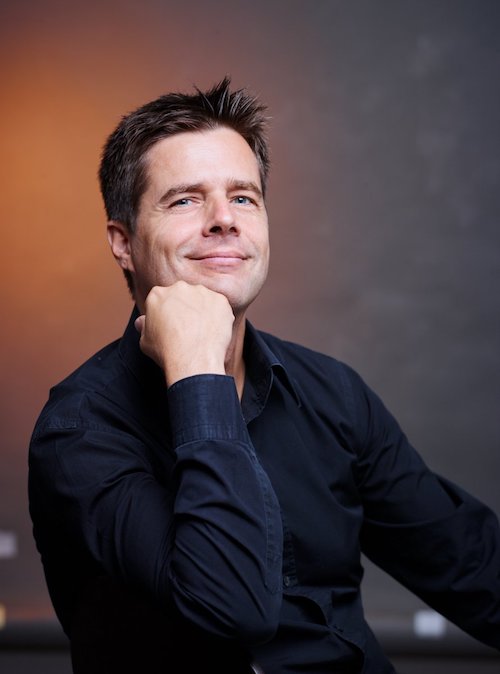Stellar guest artists enhance New World Symphony’s downsized program
The New World Symphony’s weekend program was to have offer big Romantic orchestral works by Rachmaninoff and Elgar, led by Edo de Waart.
That program was downsized due to reinstated Covid stage restrictions. Instead, it was conductor Christoph König who took the stage Sunday afternoon at New World Center to lead a revised program of chamber-size works. König was joined by pianist George Li, and New York Philharmonic string principals Frank Huang, Qianqian Li, Cynthia Phelps, and Carter Brey.
Strolling in with carefree elegance, Edward Elgar’s Serenade in E minor for String Orchestra conjured images of bygone years. Written in 1892, this three-movement work is reminiscent of 18th-century enlightenment in its dance-like outer movements and lyrical middle Larghetto.
With a gentle and subdued approach, König led the ensemble to explore delicate inflections in the first and third movements. The second movement brimmed with generous legato lines and captivating voicing in the transparent textures.
A silver medalist of the Tchaikovsky Competition, Li was originally scheduled to perform Rachmaninoff’s Second Piano Concerto. Instead he was joined by NWS fellows (violinist Christina Choi, violist Mario Rivera, cellist Amy Sunyoung Lee, and bassist Daniel Carson) in selections from Schubert’s Quintet in A major for Piano and Strings, D. 667 “Trout.”
Written at age 20, Schubert had already composed 300 lieder when his friend, amateur cellist Sylvester Paumgartner, asked Schubert to transform the catchy motif of his song “Die Forelle” into a piano quintet. The quintet setting of the humble fish’s theme is a clever layout of virtuoso outbursts made all the more challenging by the sudden stark contrasts.
The NWS fellows and pianist Li served up an exciting rendition of movements 1, 4, and 5. They oscillated between expressive playing and crisp articulations that heightened the musical drama. Li’s inventive turns of phrases and nuanced tone production brought freshness to each movement. He achieved a fine balance between soloistic presence and astute chamber musicianship that was a pleasure to see and hear.
The second half saw conductor König take a more assertive role as he drew greater dynamism from the ensemble.
Easily the most successful work on the program was Arnold Schoenberg’s Transfigured Night. Written in 1899 for string sextet and arranged for string orchestra in 1943, Schoenberg’s structure follows the shape of the poem with the same title by Richard Dehmel. A quasi-programmatic work, Transfigured Night becomes a musical representation of the emotional journey of a couple that while walking on a moonlit night face the revelation that she is carrying another man’s child. Cast in an extended single movement, Schoenberg threads high-strung tension and blissful calmness in a seamless way.
König’s direction conveyed this dichotomy beautifully. The organic ebb and flow that ensued right from the first bars carried through as the music rose to desperate outbursts, returned to more intimate rumination, and then charged forward again, to finally end in warmth as the man announces that he will raise the child like his own. The New York Philharmonic’s string principals each headed the chamber orchestra’s sections and shone in their emotive solos.
Joseph Haydn’s Symphony No. 59 in A major closed the afternoon Subtitled “Fire,” this symphony hails from the composer’s Strum und Drang period with an unusually fast first movement (Presto) that must have certainly shocked its original audience.
Sunday’s performance started off on unsteady footing but soon recovered. The second movement, a charming Andante o più tosto allegretto, was rendered with pristine stylistic awareness, each phrase drawn out with balance and flair. The minuet brought humor with brazen contrast and mood shifts, and the final Allegro assai breezed through energetically. The musicians even endured a brief but unfortunate stage blackout without skipping a beat, giving the coda even more exhilarating impact.
The New World Symphony presents a chamber concert with mezzo-soprano Ronnita Miller 2 p.m. January 30. www.nws.edu
Posted in Performances
Leave a Comment
Mon Jan 24, 2022
at 3:08 pm
No Comments
